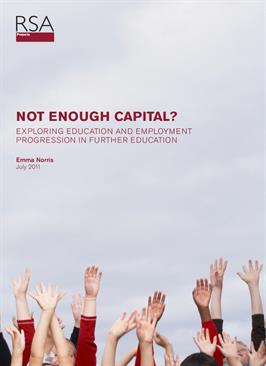The socio-economic gap in educational achievement remains wide and intractable despite numerous attempts to address it. Social class is the strongest predictor of educational attainment. Whether it is because your parents can pay your rent during an internship, use their contacts to secure work experience or simply provide a lifestyle that familiarises you with the predominantly middle-class worlds of higher education and elite progressions, who your parents are will have a bigger impact on your life chances than your ability.
Young people from low-income backgrounds need better formal and informal support to help them traverse this gap, make decisions about progression and ultimately have fulfilling careers. The RSA is exploring how civil society organisations can support disadvantaged young people in both educational attainment and progression into the workplace.
In order to develop this work, in early 2011 the RSA held a series of focus groups with young people and practitioners in Further Education (FE) colleges. This research supported the development of a mentoring partnership between the RSA and the FE sector. But the research also provided insight into the perspectives of young people and their teachers about the difficulties that young people from low-income backgrounds face when making crucial decisions about education and careers. These perspectives, supported by a literature review and desk research, are shared in this paper.
Our research focuses on the FE sector because this is where a majority of young people from lowincome families are concentrated in their post-16 studies. Working well, the FE sector can support disadvantaged young people into fulfilling careers, perhaps via higher education. But at the moment the sector is constrained in this role due to its comparative under-funding, lack of policy attention and low status compared to higher education and school sixth forms. This paper describes the barriers that the young people we spoke to face when progressing in education and the workplace, and supported by existing research provides suggestions for how the FE sector can better support them.
pdf 858.3 KB
Contributors

